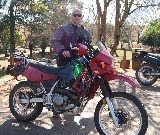The following piece was written with terrorism in mind, but I have adapted it for a typical crime scenario. Do not be fooled – Surveillance is alive and kicking in South Africa. Most of the bigger crimes like car – jackings, house break – ins and the like follow a period of surveillance where the thieve or thieves will get to know you well enough to know what your next move is going to be.
LeonDude
Don't forget to visit my Security forum at http://www.togetheragainstcrime.net/forum/index.php
Surveillance
The purpose of surveillance is to identify a potential target based on the security precautions that individual takes, and the most suitable time, location, and method of attack. Surveillance may last for days or weeks. Naturally, the surveillance of a person who has set routines and who takes few precautions will take less time.
Detecting surveillance requires a fairly constant state of alertness and, therefore, must become a habit. A good sense of what is normal and what is unusual in your surroundings could be more important than any other type of security precaution you may take. Above all, do not hesitate to report any unusual event.
There are three forms of surveillance: foot, vehicular, and stationary. People who have well-established routines permit surveillants to use methods that are much more difficult to detect.
If, for example, you leave the office at the same time each day and travel by the most direct route to your home or if you live in a remote area with few or no alternate routes to your home, surveillants have no need to follow you all the way to your residence.
You should:
• Vary your routes and times of travel.
• Be familiar with your route and have alternate routes.
• Check regularly for surveillance.
Stationary surveillance is most commonly used by terrorist organizations. Most attacks take place near the victim’s residence, because that part of the route is least easily varied. People are generally most vulnerable in the morning when departing for work because these times are more predictable than evening arrivals.
Many surveillance teams use vans with windows in the sides or back that permit observation from the interior of the van. Often the van will have the name of a business or utility company to provide some pretext for being in the area.
Where it is not possible to watch the residence unobserved, surveillants must come up with a plausible reason for being in the area. Women and children are often used to give an appearance of innocence. Try to check the street in front of your home from a window before you go out each day.
If you suspect that you are being followed, drive to the nearest police station. Note the license numbers, color and make of the vehicle, and any information printed on its sides that may be useful in tracing the vehicle or its occupants.
Don’t wait to verify surveillance before you report it.
Be alert to people disguised as public utility crews, road workers, vendors, etc., who might station themselves near your home or office.
Whenever possible, leave your car in a secured parking area. Be especially alert in underground parking areas.
Household staff and family members should be reminded to look for suspicious activities around your residence; for example, surveillance, attempts to gain access to your residence by fraudulent means, and telephone calls or other inquiries requesting personal information.
Tell your household staff and family members to note descriptions and license numbers of suspicious vehicles. Advise them to be alert for details. Household staff can be one of the most effective defensive mechanisms in your home--use them to your advantage.
While there are no guarantees that these precautions, even if diligently adhered to, will protect you from crime, they can reduce your vulnerability and, therefore, your chances of becoming a victim.



